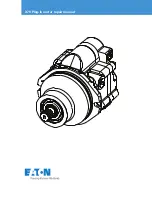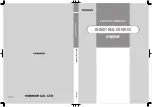
1. Charge the engine lubrication system with lubricating oil using a
commercially-available pressure pre-lubricator. Fill the engine to the proper
level with the recommended viscosity and grade of engine oil, Refer to section
"Synthetic Oils and Additives".
2. After pre-lubricating, check the lubricating oil level, Refer to section "How to
Check the Lubricating Oil Level". If necessary, top off by filling engine oil no
more than 5.0 L (5.2 qt) at a time. Do not overfill as overfilling the oil pan can
cause engine damage.
Fuel System Checks
Make sure the fuel shutoff valve (if used) is open. If the shutoff valve is even
partially closed, it may cause erratic engine operation due to an inadequate supply
of fuel to the fuel pump. Fill the tanks with the recommended fuel. Keeping tanks
full reduces water condensation and helps keep fuel cool, which is important to
engine performance. Full tanks also reduce the chance for microbe (black slime)
growth. For fuel recommendations, Refer to section "How to Select Fuel".
Do not use external starting aids. If an external starting aid is used, such as a
starting fluid, the heat generated by the external fuel source will cause the injector
tips to be damaged when the fuel cools them. The internal injector components can
be scored from running without lubrication.
If air has entered the fuel system, the fuel system must be primed to ensure prompt
starting and even running. Priming the fuel system includes the use of special tools.
Authorized Detroit™ service outlets are properly equipped for this type of service.
Never use the starting motor and fuel pump to prime the fuel system. Prolonged use
of the starting motor and fuel pump to prime the fuel system can result in damage
to the starter, fuel pump, and injectors. Priming of the fuel system is required if the
fuel system has been opened.
Drain off any water that has accumulated in the coalescer. Water in fuel can
seriously affect engine performance and may cause engine damage, Refer to section
"How to Drain the Fuel Coalescer".
Adding Fuel
To ensure maximum engine performance, always use Detroit™ approved fuels,
Refer to section "How to Select Fuel". Higher sulfur levels will damage the engine
Aftertreatment System (ATS).
When adding fuel, pay attention to the following:
1. Add winter or summer grade fuel according to the season of the year.
2. Work in the cleanest conditions possible.
3. Prevent water from entering the fuel tank.
Checking Other Engine and ATS Related Parts
Check the engine compartment as follows:
Engine Operation
24
All information subject to change without notice.
Copyright © 2020 DETROIT DIESEL CORPORATION
DDC-SVC-MAN-0217
















































